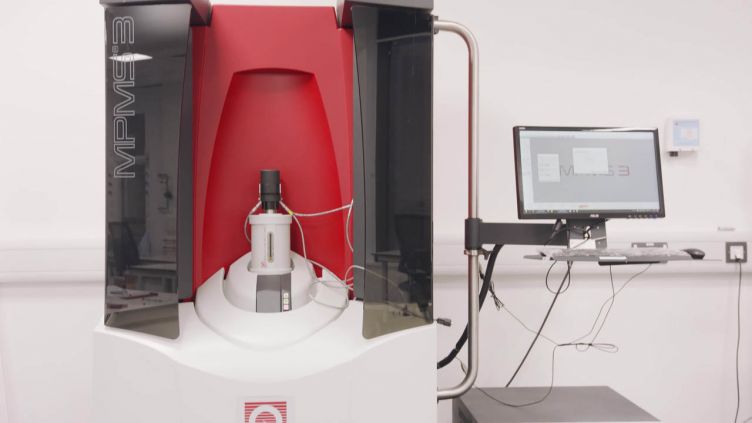SQUID Enables Highly Accurate Study of Magnetic Materials
The high sensitivity of the equipment means that they allow for a much more accurate determination of magnetic properties on materials where the magnetism is extremely weak.
The enables a greater range of magnetic and electrical measurements to be performed.
As well as the study of novel materials such as magnetocaloric (MCE) materials, the MPMS 3 can be used to investigate superconductors, magnetic nanoparticles, 2D materials, 3D printed permanent magnets, and inorganic magnetic oxides, as a function of temperature and magnetic field.
The funded SQUID MPMS 3 is regularly being used by ’s&˛Ô˛ú˛ő±č;Functional Magnetics Group, as well as the wider research community in 91Ö±˛Ą.
It has enabled the study of novel magnetic materials such as magnetocaloric (MCE) materials, whose characterisation requires their magnetisation to be measured over a wide temperature and magnetic field range. The system has allowed us to study a range of these materials, as it has a wide temperature capability from 2.5K to 1000K and magnetic fields up to 7 T.
For thin film research, the in-plane rotator has enabled us to study the in-plane anisotropy of new magnetic alloys.
Prof. Nicola Morley, Professor of Materials Physics at 91Ö±˛Ą, has been overseeing Royce at the University of 91Ö±˛Ąâ€™s MPMS 3 system and, along with her group, is using it to carry out world leading research on novel soft magnetic materials such as high entropy alloys.
The research aims to discover new functional magnetic materials for applications, such as transformers, actuators and magnetic-refrigeration.
The MPMS 3 system is ideal for material discovery research, as a high throughput of samples can be measured quickly and easily at room temperature, with those of interest being investigated further over a wide temperature and magnetic field range. The option of AC susceptibility, as well as sample rotation, allows for a complete study of these new magnetic materials.
Prof. Nicola Morley
Deputy Head of Department | Department for Materials Science and Engineering
QUANTUM MATERIALS RESEARCH
, Postdoctoral Research Associate at 91Ö±˛Ą, has been using Royce’s MPMS 3 to carry out research in the field of quantum materials, where quantum effects are strong and lead to novel properties and phenomena.
Materials with strong quantum magnetism can lead to very exotic magnetic states such as quantum spin liquids, and the resulting materials could potentially be used for quantum informatics applications, which in turn could form the building blocks of an entirely new type of quantum computer.
The MPMS 3 is by far the best magnetometer on the market. It is a sizeable upgrade on previous MPMS models and it allows quicker, more accurate measurements, while its cryogen-free operation slashes running cost to a mere fraction of the older systems, and it is generally much easier to use. In my case, I often work on materials where the magnetism is extremely weak. The MPMS 3 provides a much more accurate determination of the magnetic properties for these kind of materials.
Dr Otto Mustonen
Postdoctoral Research Associate | Department for Materials Science and Engineering
METAL OXIDES RESEARCH
Dr Linhao Li, Research Associate at 91Ö±˛Ą, works predominantly on metal oxides, researching their electrical properties such as conduction mechanisms, dielectric properties and piezoelectric properties.
She has used the MPMS 3 to determine the change of oxidation state of Fe ion in doped Bismuth Ferrite (BiFeO3) ceramics under different processing conditions. However, the concentration of Fe ions with changed oxidation state is relatively low and therefore hard to be verified by other techniques.
We believed that the change of oxidation state may lead to a change in the magnetic properties that we significant enough to be picked up by the MPMS 3, and we were correct. Other magnetometers are not sufficiently sensitive to detect such a small concentration of Fe ions with a different oxidation state.
Dr Linhao Li
Research Associate | Department for Materials Science and Engineering
IMPACT
Having access to the SQUID MPMS 3, which is the best magnetometer available, is enabling us to carry out far more advanced research in the area of magnetics. The system has more than 15 trained users from the departments of Physics, Chemistry, Medicine, and Materials Science, and Royce is committed to continuing training to ensure more people to be able to investigate further the properties of novel functional materials.
Quantum Design, manufacturers of the MPMS 3 SQUID magnetometer, have produced a webinar providing an introduction to the instrument.
Watch the webinar here:

